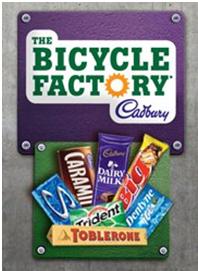Best known for their chocolate Easter eggs, the Cadbury Corporation continues their fundraising drive to build 5,000 bikes a year for children in rural Ghana with The Bicycle Factory. Cadbury urges their consumers to enter the UPC barcode numbers from Cadbury products into their website. Each barcode represents one physical component of a bike called the Nframa, which means “wind” in Ghanaian. One bike is made up of 100 parts, meaning it takes 100 UPC entries to “build” a bike.

Bicycles serve as an important means of transportation in the developing world. Cadbury showcases this utility in their advertising campaign in which a girl uses her bike as a delivery van, ambulance, water truck, and school bus. Bikes also do not rely on fossil fuel, and can help transport people and food on bumpy or unpaved roads. The fundraiser is a chance to “give back to the people who have given us so much,” says Cadbury, who “sources most of [their] cocoa from Ghana today”. Since establishing the program in 2009, Cadbury has collected enough barcodes to produce 10,237 bikes.
This program is part of a larger commitment by Cadbury to improve the lives of farmers. In 2008, Cadbury joined with the United Nations Development Program (UNDP), the Ghanaian government, and other partners to create the Cadbury Cocoa Partnership. This partnership, focusing on small-holder farmers, is designed to improve yields of Ghanaian cocoa farmers as well as introduce new forms of rural income, invest in community-led development, and undertake biodiversity and water quality control programs. In 2009 Cadbury furthered its commitment to Ghanaian farmers when it announced its dedication to receiving Fairtrade certification for its cocoa.
By Grant Potter

Danielle Nierenberg, an expert on livestock and sustainability, currently serves as Project Director of State of World 2011 for the Worldwatch Institute, a Washington, DC-based environmental think tank. Her knowledge of factory farming and its global spread and sustainable agriculture has been cited widely in the New York Times Magazine, the International Herald Tribune, the Washington Post, and
other publications.
Danielle worked for two years as a Peace Corps volunteer in the Dominican Republic. She is currently traveling across Africa looking at innovations that are working to alleviate hunger and poverty and blogging everyday at Worldwatch Institute’s Nourishing the Planet. She has a regular column with the Mail & Guardian, the Kansas City Star, and the Huffington Post and her writing was been featured in newspapers across Africa including the Cape Town Argus, the Zambia Daily Mail, Coast Week (Kenya), and other African publications. She holds an M.S. in agriculture, food, and environment from Tufts University and a B.A. in environmental policy from Monmouth College.








